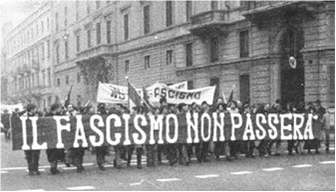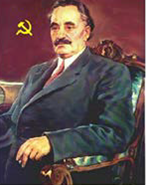NORWAY
Revolusjon
The book “A people’s front against crisis, war and fascism” was
published by Revolusjon in 2013. Apart from Dimitrov’s report, it
includes a preface and an introduction dealing with the problems of how
the policy of the united front should be understood and put into
practice under the current historical and political conditions in our
country.
The policy of the united front is a core element of the tactical line
of the communists. Nevertheless, it has given rise to considerable
uncertainty and confusion.
Georgi Dimitrov, Secretary General of the Communist International
(Comintern), used the Seventh World Congress held in 1935 to elaborate
and explain the united front and the popular front policy and the
necessity of cooperation in struggle against the capitalist attacks,
against fascism and imperialist war.
We find it appropriate to re-publish this document, because the issues
on the agenda at that time, have once again become crucial. The world
capitalist system, especially in Europe, is undergoing the most serious
economic crisis and recession since the world crisis that followed
after the crash of 1929. Unemployment is enormous and increasing, the
labour movement is to a certain extent paralyzed by decades of
social-democratic class collaborationist politics, and today the
democratic and social rights are under constant attack from the forces
of capital.
Fascism is once again a real threat: In some European countries, such
as Hungary and Greece, it is about to gain mass support. And as in the
1930s, the danger of new imperialist wars is imminent.
In his main report to the Seventh Congress, Dimitrov says:
“The imperialist circles are trying to shift the whole burden of the
crisis onto the shoulders of the working people. That is why they need
fascism.
“They are trying to solve the problem of markets by enslaving the weak
nations, by intensifying colonial oppression and repartitioning the
world anew by means of war. That is why they need fascism. “
Finance capital demands cuts in wages and welfare while the capitalists themselves plunder public funds from state budgets.
 The imperialist powers, especially the United States and the NATO
countries, have embarked on an increasingly aggressive war policy where
they even disregard the United Nations – a world system that came into
being after the defeat of fascism in the wake of World War II. The
peoples and governments are threatened, attacked and occupied through
bloody wars. At present (summer 2013 – translator’s note),Syria is
designated as the target of a new imperialist war of aggression.
The imperialist powers, especially the United States and the NATO
countries, have embarked on an increasingly aggressive war policy where
they even disregard the United Nations – a world system that came into
being after the defeat of fascism in the wake of World War II. The
peoples and governments are threatened, attacked and occupied through
bloody wars. At present (summer 2013 – translator’s note),Syria is
designated as the target of a new imperialist war of aggression.
The peoples are paying with their very lives and their natural
resources are being plundered, while the workers in the imperialist
countries have to pay for the extreme and growing military spending. To
justify their war policy, the great powers appeal to chauvinism and
racism, and thus give fascism an opening in their own countries.
In this way finance capital shifts the burdens of the crisis onto the
working class and the peoples. It creates greater social inequalities,
death and misery – but at the same time it spurs popular struggle and
resistance. The crisis might lead to revolution, provided that there
exists a political force with mass influence and tactical ability to
develop movements that could overthrow the bourgeoisie and the
pro-imperialist governments. However, if this force is not strong
enough, we know that the crisis may also lead to fascism.
The most important difference between the period leading up to World
War II and the situation today is that at that time there was a mighty
socialist workers’ state, the Soviet Union, and a strong international
communist world movement. Today, the working class has no such fortress
to shelter and defend its interests.
<>
The
Marxist-Leninist parties and organizations are – with some exceptions –
small and with little or limited influence within the working class in
their respective countries. The contrast to the period when Dimitrov
delivered his famous report to the Congress of the Comintern is immense.
The reason for this negative situation for the world proletariat is the
capitalist and revisionist counter-revolution in what once was the
socialist camp. Here we will not embark on analysing what led to this
counter-revolution and why it came about; this is a big and serious
issue that has been and is being elaborated in other contexts.
The question we put forward at this moment is this: Does the fact that
the working class is in a worse position now than it was in 1935, imply
that the question of the united front and the popular front is more or
less important today?
 Our answer is that the policy of the united front and the popular front
is even more important today than it was in 1935, precisely because of
the weakened position of the working class and the communists.
Our answer is that the policy of the united front and the popular front
is even more important today than it was in 1935, precisely because of
the weakened position of the working class and the communists.
Once again we are faced with the task of building a popular front
against crisis, war and fascism. This is the practical response of the
communists to the imperialist policy of making workers pay for the
capitalist crisis. In this respect, the lessons and instructions given
by Dimitrov are highly relevant.
Dimitrov illustrates how to combine firmness of principle with agility.
He reminds us that we communists always have to think and analyse
matters independently, that they must learn to master Marxist-Leninist
theory as a guide, that they must rid themselves of sectarianism and
rigid propaganda that is more or less incomprehensible to the working
people. He also warns against the danger of right opportunism, which
will occur if the communists allow themselves to “drown” in the front
and forget their revolutionary goals and the leading role of the Party.
In the introductory chapter (not included in this translation –
translator’s note),we study some aspects of the united front tactics
and the tasks and specific challenges of promoting a Marxist-Leninist
policy in contemporary Norway.
Revolution Publishing House
Oslo 2013
Click here to return to the Index, U&S 28
 The imperialist powers, especially the United States and the NATO
countries, have embarked on an increasingly aggressive war policy where
they even disregard the United Nations – a world system that came into
being after the defeat of fascism in the wake of World War II. The
peoples and governments are threatened, attacked and occupied through
bloody wars. At present (summer 2013 – translator’s note),Syria is
designated as the target of a new imperialist war of aggression.
The imperialist powers, especially the United States and the NATO
countries, have embarked on an increasingly aggressive war policy where
they even disregard the United Nations – a world system that came into
being after the defeat of fascism in the wake of World War II. The
peoples and governments are threatened, attacked and occupied through
bloody wars. At present (summer 2013 – translator’s note),Syria is
designated as the target of a new imperialist war of aggression. Our answer is that the policy of the united front and the popular front
is even more important today than it was in 1935, precisely because of
the weakened position of the working class and the communists.
Our answer is that the policy of the united front and the popular front
is even more important today than it was in 1935, precisely because of
the weakened position of the working class and the communists.